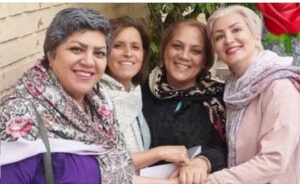The following is based on a communication sent by the UN Special Rapporteur on Human Rights Defenders and other UN experts to the Government of Egypt on 8 January 2025. The communication remained confidential for 60 days before being made public, giving the Government time to reply. The Government replied on 6 March 2025.
Since the communication was sent, human rights defender Ibrahim Metwally has been interrogated on charges related to all three of the cases against him, but no dates for his trial in any of them have been set. The situation has remained the same for women human rights defenders Aisha al-Shater and Hoda Abdel-Moneim.
This is a shorter version of the original communication.
BACKGROUND
Topic: the use of repeated and similar national security and counter-terrorism related charges against human rights defenders in detention, including Ms. Aisha al-Shater, who is serving a long-term sentence, and Ms. Hoda Abdel-Moneim and Mr. Ibrahim Metwally, who have been held in pre-trial detention for years; and the alleged poor prison conditions in which the human rights defenders are detained and their continued lack of access to appropriate healthcare.
The three human rights defenders have been subjected to long-term pre-trial detention beyond the legal limit of two years, as a result of the addition of new cases with nearly identical charges, in a practice commonly known as “rotation”.
Ms. Aisha al-Shater is a woman human rights defender and a board member of the Egyptian Coordination for Rights and Freedoms (ECdRF). She was arrested in November 2018 and forcibly disappeared for three weeks, during which she was subjected to physical and psychological ill treatment amounting to torture. Ms. Al-Shater’s enforced disappearance was previously registered under the humanitarian procedure of the Working Group on enforced or involuntary disappearances. She has been serving a long-term prison sentence. She was reportedly subjected to long periods of solitary confinement. Her health has significantly deteriorated in prison, and she has allegedly not received appropriate medical attention and healthcare.
Ms. Hoda Abdel-Moneim is a lawyer, a woman human rights defender, a board member of the ECdRF, and a former member of the National Council for Human Rights. She was arrested on 1 November 2018 and reportedly forcibly disappeared until 21 November 2018, when she was brought before the Supreme State Security Prosecution (SSSP). Ms. Abdel-Moneim’s enforced disappearance was previously registered under the humanitarian procedure of the Working Group on enforced or involuntary disappearances. In prison, her health deteriorated significantly, and she reportedly did not receive appropriate medical attention and healthcare.
Mr. Ibrahim Metwally is a lawyer, human rights defender and coordinator for the Association of the Families of the Disappeared in Egypt, an association which he created following the enforced disappearance of his son in 2013. Mr. Metwally was arrested on 10 September 2017 and reportedly forcibly disappeared for 20 days before being bright before the SSSP. His case was previously registered under the humanitarian procedure of the Working Group on enforced or involuntary disappearances. He has been held in pre-trial detention for over seven years. His health has deteriorated since his detention in 2017, including as a result of the torture he reportedly experienced and has not received adequate medical treatment or care for his conditions.
Background regarding the cases of Ms. Aisha al-Shater and Ms. Hoda Abdel-Moneim
On 13 September 2021, the joint trial of Ms. al-Shater and Ms. Abdel-Moneim began before the Terrorism Circuit at the Emergency State Security Court (ESSC) in case No. 1552/2018. Defence lawyers attended the hearing, during which they were allowed to read the indictment sheet for the first time. Both human rights defenders were charged with leadership, membership, or support of a terrorist organization, receiving foreign funds in order to carry out its aims, and promoting its ideas, under articles 2 and 3 of the Anti-terrorism law and articles 86 and 86 bis of the Egyptian Penal Code, and publishing false news on the ECdRF social media pages which would “disturb public security and harm national interest, and supplying international institutions with false information”. Their pre-trial detention was repeatedly renewed on a periodic and arbitrary basis for three years.
On 5 March 2023, the ESSC sentenced Ms. Abdel-Moneim to five years in prison, backdated to her arrest in October 2018, on the charge of joining an unspecified terrorist organization. She was acquitted of the charge of receiving foreign funds in order to carry out its aims. Ms. al-Shater was sentenced to ten years in prison. The two human rights defenders were put on the list of terrorists for five years after the end of their prison terms, which places them under a travel ban and subjects them to an asset freeze. They were held in Al-Qanater women’s prison until their transfer in June 2023 to 10th Ramadan Prison, a new establishment built on the outskirts of Cairo.
On 31 October 2023, Ms. Abdel-Moneim completed her five-year sentence in case No. 1552/2018 and was due to be freed on 1 November 2023. That same day, Ms. Abdel-Moneim was summoned by the SSSP, in the presence of her lawyer. She was informed of two new charges against her and that her name had also been added to an earlier SSSP case, No. 730/2020. The charges included that of joining an unspecified terrorist organisation, which is identical to the charge she had served the sentence for, and that of receiving foreign funds in order to carry out its aims, a charge of which she had already been acquitted. She was ordered to remain in pre-trial detention on the new charges for 15 days, then 45 days, renewable.
Concerns regarding the cases of Ms. Hoda Abdel-Moneim and Ms. Aisha al-Shater have been raised in four previous joint communications sent by Special Procedures mandate holders to the Egyptian Government, including EGY 2/2023, EGY 12/2021, EGY 5/2021, and EGY 6/2019.
Ms. Abdel-Moneim has also been the subject of a previous communication sent by Special Procedures mandate holders to the Egyptian Government (EGY 2/2021). Special Procedures mandate holders also communicated their specific concern regarding the health and conditions in prison of Ms. Abdel-Moneim in a communication sent to the Egyptian Government on 22 January 2024 (EGY 7/2023). Information about Ms. Abdel-Moneim’s lengthy pre-trial detention beyond the legal limit of two years was included in the report of the Special Rapporteur on the situation of human rights defenders focusing on the long-term detention of human rights defenders (A/76/143, para. 113-117).
In addition, Special Procedures mandate holders expressed their concern regarding the incompatibility of Egypt’s Terrorism Circuit Courts (hereinafter TCCs) with international due process guarantees in a communication to the Egyptian Government (EGY 13/2020) sent on 2 October 2020, as well as a communication regarding Egypt’s anti-terrorism law (EGY 4/2020) sent on 28 February 2020.
Background regarding the case of Mr. Ibrahim Metwally
On 10 September 2017, Mr. Metwally was arrested at Cairo Airport as he was boarding a flight to Geneva, Switzerland, to meet with the Working Group on Enforced or Involuntary Disappearances. He was subsequently forcibly disappeared and was subjected to ill-treatment and torture until his presentation before the SSSP on 12 September 2017, where he was accused in case No. 900/2017 of founding an illegal organisation, conspiracy with foreign entities and spreading false information, punishable under articles 12, 13 and 28 of the Anti-Terrorism Law. Each of the accusations seems directly linked to his human rights work and interaction with UN human rights mechanisms. He was placed in preventive detention.
In October 2019, the Cairo Criminal Court ordered Mr. Metwally’s conditional release in case No. 900/2017. However, he was not released, and in November 2019 the SSSP attached him to a new case, No. 1470/2019, with the charges of membership and financing of a terrorist organisation. He was placed in preventive detention in the State Security Headquarters of Kafr al-Sheikh, close to his family home, and then moved to Tanta Prison.
In late August 2020, the Cairo Criminal Court ordered his conditional release in case No. 1470/2019. He was not released and in early September 2020, the SSSP related Mr. Metwally to a third case, No. 786/2020, accusing him of leadership of a terrorist group formed while in detention, communicating with foreign agents to harm State security, and using the internet for terrorist purposes, which are punishable under articles 12, 14 and 29 of the Anti-Terrorism Law, as well as for establishing an illegal organisation and publishing false news and rumours under articles 86 bis and 188 of the Penal Code. He was held in pre-trial detention in Maximum Security Prison II within the Tora Prison Complex, south of Cairo.
Concerns as to the case of Mr. Metwally, including on reported reprisals against him for his cooperation with the UN, were previously raised by Special Procedures mandate holders on four occasions, including in EGY 5/2021, EGY 10/2020, EGY 12/2019 and EGY 14/2017.
Mr. Metwally was also the subject of an opinion issued by the Working Group on Arbitrary Detention, wherein the Working Group found his detention to be arbitrary noting that his detention amounts to an act of retaliation for cooperation with the UN (A/HRC/WGAD/2019/41).
ALLEGATIONS
Regarding the case of Ms. al-Shater:
On 18 November 2024, Ms. al-Shater was interrogated by the SSSP regarding a second case, No. 800/2019 State Security, in which she was charged with joining and financing a terrorist organisation. The charge of joining an unnamed terrorist organisation is identical to that for which she is currently serving a ten-year sentence in case No. 1552/2018. She is currently serving her sentence in 10th Ramadan Prison.
On 9 December 2024, case No. 800/2019 was referred to the Cairo State Security Criminal Court.
Requests by her lawyer for her transfer to hospital and to obtain her medical records have been denied. As of late 2024, Ms. al-Shater has been allowed regular family visits, but none by her lawyer.
Regarding the case of Ms. Hoda Abdel-Moneim:
On 17 November 2024, Ms. Abdel-Moneim was interrogated regarding a third case, No. 800/2019 State Security, and was charged with joining and financing an unnamed terrorist organisation. The charge of joining an unnamed terrorist organisation is identical to the charge made against her in case No. 730/2020 on 1 November 2023, and to the charge against her in case No. 1552/2018 for which she had completed a five-year sentence on 31 October 2023.
On 5 November 2024, Ms. Abdel-Moneim’s pre-trial detention was renewed for 45 days in the second case, No. 730/2020. She is held in 10th Ramadan Prison and is allowed regular family visits but none by her lawyer.
On 9 December 2024, the first hearing in Ms. Abdel Moneim’s case No. 730/2020 was held by Cairo State Security Criminal Court and was conducted online. Case No. 800/2019 was referred to the same court on the same day. At the time of writing, a hearing has not been set.
In early 2024, Ms. Abdel-Moneim was moved briefly to the prison medical centre before being sent back to her cell. She has continued to be denied adequate medical treatment required for the severity of her condition, and requests by her lawyer for her transfer to hospital and to obtain her medical records have been rejected.
Prison authorities have not provided her with adequate medical treatment or transfer to a hospital when needed. They have also denied her family access to her medical records for possible independent consultation.
Regarding the case of Mr. Ibrahim Metwally:
Mr. Metwally was moved in 2022 to Badr 3 Prison in 2022, a new establishment on the outskirts of Cairo. He is being held in pre-trial detention for the third case against him, No. 786/2020, culminating in a total of more than seven years of pre-trial detention for similar cases, in contradiction with Egyptian law which places a limit of two years of pre-trial detention.
In November 2024, Mr. Metwally was interrogated by the SSSP on charges related to the first case, No. 900/2017. No trial date has been set, and no date for his interrogation in the second and third cases he is facing have been set.
His health has deteriorated since his detention in 2017, including as a result of the torture he reportedly experienced. He has not received adequate medical treatment or care for his conditions. Despite a prison doctor recommending surgery, prison authorities did not allow it, and he has instead been provided with pain killers. In June 2023, he was allowed the first family visit since his arrest in 2017. He is not allowed visits by his lawyer.
CONCERNS
In the communication, we express serious concern that Ms. Abdel-Moneim, Ms. al-Shater and Mr. Metwally were presented with new charges, which are nearly identical to the previous charges they faced, and that as a result, they are kept in prolonged pre-trial detention. The charges brought against Ms. Abdel Moneim are identical to those she has served a sentence for, and those brought against Ms. al-Shater are identical to those she was convicted of and is currently serving a sentence for. We are concerned by what appears to be a violation of protection from double jeopardy in the use of the same charge against Ms. Abdel Moneim and Mr. Metwally three times, and twice against Ms. al-Shater. These cases involve apparent violations of the principle of non bis in idem under article 14(7) of the International Covenant on Civil and Political Rights (ICCPR) ratified by Egypt on 14 January 1982, which guarantees that individuals may not be tried or punished twice for the same act in respect of which they have already been finally convicted or acquitted.
It is worth noting that the practice of using identical or similar charges in new cases by combining them with new accusations has been previously used against human rights defenders. This method was the subject of two previous communications sent by Special Procedures mandate holders to the Egyptian Government, EGY 7/2023 and EGY 5/2021, which addressed the extremely lengthy periods of arbitrary pre-trial detention through the attachment of the human rights defenders to new cases wherein they face similar accusations as initially brought against them. In its concluding observations of Egypt’s last review in March 2023, the UN Human Rights Committee expressed concern at the practice of “rotation”, used to extend pre-trial detention of human rights defenders, among others (CCPR/C/EGY/CO/5, para. 31).
In line with our previous communications (EGY 1/2022 and EGY 4/2020), we also reiterate our concerns about the vagueness of the counterterrorism and national security legislation in Egypt. We note with concern that this legislation is reportedly being misused to target, inter alia, human rights defenders critical of the Government. We underscore to the Government of Egypt that counter-terrorism legislation should be sufficiently precise to comply with the principle of legality recognised under article 15 of the ICCPR so as to prevent its use to unjustifiably target human rights defenders, civil society, journalists, or other persons on political, religious or other grounds.
We are further concerned about allegations concerning Ms. Abdel Moneim’s, Ms. al-Shater’s and Mr. Metwally’s poor health condition and the apparent lack of adequate medical care and treatment provided to the three human rights defenders, as well as about the reported inaccessibility of their medical records by their lawyer or family. We are seriously troubled by the information received that the human rights defenders have reportedly been subjected to enforced disappearance, mistreated and/or tortured while in custody and denied appropriate access to the necessary medical care that they have applied for, which may amount to a violation of the absolute and non-derogable prohibition of enforced disappearance and against torture and other cruel, inhuman or degrading treatment or punishment. In this connection, we would like to reiterate that the State has a duty of care to individuals in their custody, as established by article 10 of the ICCPR, to ensure humane conditions of detention and respect for the dignity of individuals deprived of their liberty. We emphasize that those charged with terrorism-related offences are entitled to the same standard of care in prison as all other inmates. We also further make reference to the Working Group on enforced or involuntary disappearances General Allegation letter transmitted after its 131st Session in September 2023, which raises concerns reported obstacles encountered in the implementation of the Declaration on the Protection of All Persons from Enforced Disappearance in Egypt.



